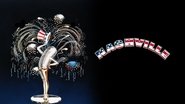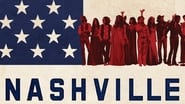Woodyanders
Robert Altman's sprawling, yet remarkably rich, compelling, and cohesive mosaic of Bicentennial-era America chronicles several days in the lives of a vivid and eclectic array of people in the country music capitol of Nashville, Tennessee. Altman and the incisive script by Joan Tewkesbury astutely captures the hopes, dreams, and delusions of America in the mid-1970's, with a specific emphasis on our nation's obsession with fame, success, and celebrity, the fierce distinction between the haves and the have nots, the complex interrelationship between politics and entertainment, and the various ways men exploit, abuse, and/or degrade women. Few movies depict both the negative and positive aspects of American culture with the same wit, warmth, and vitality as this pip does. Moreover, the uniformly terrific cast rates as another substantial asset: Ronee Blakley as the fragile Barbara Jean, Allen Garfield as her overprotective husband Barnett, Keith Carradine as callous and narcissistic womanizing heel Tom Frank, Henry Gibson as the arrogant Haven Hamilton, Michael Murphy as smarmy politician John Triplette, Lily Tomlin as the sweet Linnea Reese, Ned Beatty as her neglectful lawyer husband Delbert, Gwen Welles as the ambitious, but untalented Sueleen Gay, Geraldine Chaplin as clueless and obnoxious reporter Opal, Shelley Duvall as kooky groupie L.A. Joan, David Hayward as troubled loner Kenny Frasier, Barbara Harris as the daffy, but determined Albuquerque (the climax with Harris belting out "It Don't Worry" me on stage is a real show-stopper), Bert Remsen as her cranky husband Star, Karen Black as the haughty Connie White, Scott Glenn as the smitten Private Glenn Kelly, Barbara Baxley as the brash and outspoken Lady Pearl, Robert DuQui as the hard-nosed Wade, and, in an especially poignant role, Keenan Wynn as the kindly Mr. Green. Best of all, it's a total treat to the watch the colorful characters continually cross paths with each other in a multitude of surprising and inspired ways, with a particular highlight being when Carradine sings the excellent song "I'm Easy" in a club to a handful of women who he's seduced and bedded. The songs featured on the soundtrack range from the sublime (the rousing "My Idaho Home") to the gloriously hokey (the jingoistic tune "200 Years"). Essential viewing.
SnoopyStyle
There are dozens of relevant characters as they spend their time in the city of Nashville. The stories weave an interconnected tapestry. There is a forthcoming political rally for Hal Phillip Walker as the Replacement Party candidate for President which is omnipresent throughout the movie.I disliked this movie the first time I tried to watch it. There are so many characters that it's hard to follow anything. It's story chaos. It's not just a matter of being lost. I couldn't see the point of not following the lead characters. After a few half-hearted attempts, I finally gave it a serious try. There is a zen feel about watching this movie. I could lock onto a couple of characters especially played by some of the most recognizable actors. I let the movie wash over me. The singing gets me zoned out. It's a hypnotic form of people watching. It's got the Altman style. I'm not sure whether most modern audiences could ever truly love this.
popcorninhell
What is this movie even about? I'm aware asking such a question is reductive in the face of such a vast and overwhelming cinematic accomplishment. Yet despite its melodious and melancholic emotional core and its initial impact as one of the defining films in a decade full of defining films, I still can't help but think Nashville is not meant to be interpreted. This poses a unique challenge for me as a semi-professional critic. The film is not only best appreciated by an audience that treasures experience over contemplation, emotion over logic, but gazes through the slice-of-life story with a lens trying to make sense of post-Watergate era Americana.The story, if one were to find one, follows the lives of numerous interrelated human-beings. All descend on the city of Nashville, Tennessee and all involved (or want to be involved) in the country music industry. Among the crowded field of primary characters is Haven Hamilton (Gibson) the presumed king of Nashville's music scene who also has political ambitions. There's Del (Beatty) and Linnea Reese (Tomlin) a struggling married couple; one's a lawyer the other a gospel singer. There's Tom Frank (Carradine), a self-absorbed folk-rock musician and Barbara Jean (Blakley), a famous and emotionally fragile country talent. Then there are the musical up- and-comers like Connie White (Black) and Tommy Brown (Brown). There are wannabes like Sueleen (Welles) and Albuquerque (Harris) and sycophants like Opal (Chaplin) and L.A. Joan (Duvall), all looking for absolution in a city that promises good times and possible fame.All the characters that I just listed are but a sample of the characters that drift and cross paths between Nashville's seedy nightclubs, cluttered highways and the pristine Grand Old Opry. But lest you think the narrative is too cluttered, every character has their moment to show the audience who they are and how they're changed by events larger than themselves. Meanwhile director Robert Altman captures the pathos of Nashville's microcosm in confident fashion. Characters make decisions that are at times solemn, desperate, tranquil, kind and despicable yet Altman's even hand and watchful eye looks on with fair-minded kindness and humanity.Many of Altman's detractors object to the directors presumed cynicism towards human nature which arguably interjects in some of the director's most famous works. One can't help but take a cursory look at films like M*A*S*H (1972) and The Player (1992) and wholly agree with such an assessment. Yet after my initial trepidation of consuming all things Altman, that criticism holds less sway. Altman seems to immerse and undermine systems not people. You only need to compare the visual hyperbole of M*A*S*H with the drowning pessimism of Catch-22 (1970) to see Altman doesn't dwell on the "insignificance" of man but rather the folly of social constructs. In M*A*S*H it's war; in Buffalo Bill and the Indians (1976) it's subjugation of native peoples; in Nashville it's dichotomic politics.In the case of Nashville, not only does Altman attack the binary of American politics in the story (fronted by an unseen pseudo-populist political campaign), he attacks it in how he tells he story as well. The film's narrative can be best described as post-structuralist narrative, that is to say not beholden to an underlying theme or framework. Any attempts to decipher the film would yield a bevy of contradictions that threaten to unravel any theory one can posit. Even if Altman is the director and ultimately the "author" to the film, all the music in the film was written by the actors themselves. The cacophonous sound design was the product of USC wunderkind Jim Webb who miked everyone to allow for a breadth of experience. The editing done by first-time Altman collaborator Dennis Hill gives perspective while restraining a point-of-view. Nashville gives the audience the feeling that no one is at the wheel. Even by approaching the film as a product of Robert Altman's assumed overarching modus aprendi to undermine systems has it's problems.Nashville transcends but not in the way you would expect. It accurately captures the antipathy, the uncertainty and most importantly the humanity of a certain place in time. The film has aged though in the way an autochrome photograph would. Modern audiences can appreciate it as a textured and awe-inspiring cultural accomplishment which dares to challenge film form, story structure and (maybe) the systems which bridles our lives. Without Robert Altman's subtle but indelible contribution to film, there'd be no Richard Linklater, Jim Jarmusch or Paul Thomas Anderson. Nashville showcases Altman's gentle hand, sharp wit and deep love of humanity which we all benefit from.
SmileysWorld
The film was a little slow in getting off the ground for me because all I could think is,I'm seeing Henry Gibson singing country music and I'm seeing Lily Tomlin sing gospel.Seeing both of those ideas carried out made me me feel like I was in a parallel universe.I would never think of either as singers,let alone singers of the chosen genres.When they stopped singing and began acting,their performances were above average.I liked the multiple story lines,and how all of these unrelated stories came together as one.However,I was turned off by how long they took getting there.In short,the film's not a total waste of time,but there's not really enough there to make me want to view it again.








